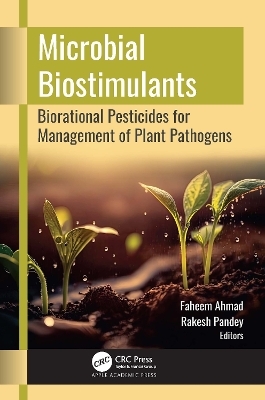
Microbial Biostimulants
Apple Academic Press Inc. (Verlag)
978-1-77491-624-7 (ISBN)
This new volume explores the field of microbial biostimulants, a new and emerging field of plant study that emphasizes the benefit of microbes for plants. Microbial biostimulants can have a positive influence on plant health and growth, enhancing agricultural yield and improving resistance to negative environmental changes with zero harmful discharges.
This book, Microbial Biostimulants: Biorational Pesticides for Management of Plant Pathogens, explores how microbial-based biopesticides can be used for managing pests and plant diseases as well as for the promotion of growth. It looks at the advantages of employing microbial biostimulants over other pest and disease control methods. It also looks at the application of microbial biostimulants as a response to the modern agricultural need for increased productivity and plant health.
This book brings together an extensive collection of information on beneficial microorganisms, including newly introduced microorganisms, their biological activities and specificity, resistance mechanisms to pests, formulation, application in agricultural practices, etc.
Key features:
Provides a roadmap for using microbial biostimulant practices for pest and disease control as a sustainable approach in agriculture
Covers the essential aspects of biorational lines for crop stress management
Looks at the use of microbial biostimulants for management of specific diseases, including root-knot disease, various soil-borne diseases, etc.
Considers the role of rhizobacteria in plant disease management
Microbial Biostimulants: Biorational Pesticides for Management of Plant Pathogens will be extremely useful for students, academicians, researchers, and policymakers in the field of food security and diverse disciplines of agricultural sciences.
Faheem Ahmad, PhD, is a Senior Assistant Professor in the Department of Botany at Aligarh Muslim University, Aligarh, India. His research is based on the study of plant-nematode interaction, plant disease, microbe-mediated biotic stress management, and agricultural biotechnology and microbiology. He is the author of more than 43 papers, associate editor of the Journal of Plant Diseases and Protection (Springer), and academic editor of Peer J-Life & Environment.Dr. Ahmad has guided one PhD student and several MSc students to date. He is a recipient of several fellowships and awards, including NRF, TSRO Young Scientist, SERB-DST Young Scientist, and TUBITAK Foreign Researcher Award. He is a fellow of the International Society for Development and Sustainability (Japan) and Bose Science Society (India). He gained postdoctoral experiences at Ehime University (Japan), North-West University (South Africa), Ege University (Turkey), and National Sun Yat-Sen University (Taiwan). Rakesh Pandey, PhD, is Professor Emeritus (Academy of Scientific & Innovative Research) and Emeritus Scientist, Crop Protection and Production Division, CSIR–Central Institute of Medicinal and Aromatic Plants, Lucknow, India. He has authored many research papers, book chapters, review articles, books, and bulletins. He holds four US patents and has developed eight disease-resistant plant varieties of medicinal and aromatic plants. He has 29 rhizospheric microbes accession numbers from the National Center for Biotechnology Information. He is a Fellow of the National Academy of Agricultural Sciences (NAAS), New Delhi. He is a recipient of several national and international awards including the Prof. H.M. Shah Memorial Award (2017), Dr. Manmohan Attavar Gold Medal in Floriculture (2017), M.R. Siddiqi Memorial Award (2018), and Prof. Uma Kant Sinha Memorial Award (2021), among others. He is President of the Indian Phytopathological Society (2022-23). Dr. Pandey has so far guided 13 PhD students and several MSc and MTech students. He has been granted several projects from national funding agencies. Dr. Pandey is an expert and task force member of the Department of Science and Technology (DST), Department of Biotechnology (DBT), Council of Scientific & Industrial Research (CSIR), and Indian Council of Agricultural Research (ICAR) for crop protection-related projects and selections.
1. Pests and Diseases: A Global Threat to Plants 2. Production of Microbial Biostimulants as a Response to the Modern Agricultural Need for Productivity and Plant Health 3. Bacillus Species: Prospects and Applications for Root-Knot Disease Management 4. Arbuscular Mycorrhizal Fungi to Protect Vegetable Crops from Pathogenic Root-Knot Nematodes 5. Unravelling the Mechanism of Microbial Biostimulants for Controlling Pests and Diseases 6. Rhizobacteria as a Potential Bioagent against Root-Galling Disease in Vegetable Crops 7. The Role of Endophytic Bacteria in Plant Immune Responses and Plant Disease Control 8. Exploring the Role of Piriformospora indica and Pichia anomala in the Management of Plant Pathogens 9. Fungal Endophytes in Plants: Friends or Betrayers? 10. Promoting Plant Growth by ACC Deaminase Enzyme-Producing Bacterial Endophytes Under Biotic Stress Conditions 11. Rhizobacteria-Induced Resistance in Plants towards Cyst Nematodes 12. Microbial and Algal Biostimulants: Modern Approach towards the Next Generation of Sustainable Agriculture 13. Microbiota in the Edible Mushroom Industry: Disease Management, Yield, and Quality Improvement 14. Microbial Consortia as Plant Biostimulants: Definition, Concept, Categories, and Regulation 15. Conditioning Root-Associated Microbiota through Root-Exudate Metabolites to Protect Plants against Soil-Borne Diseases 16. Potential of Entomopathogenic Fungi in Plant Health Management
| Erscheinungsdatum | 30.08.2024 |
|---|---|
| Zusatzinfo | 19 Tables, black and white; 20 Illustrations, color; 5 Illustrations, black and white |
| Verlagsort | Oakville |
| Sprache | englisch |
| Maße | 156 x 234 mm |
| Gewicht | 984 g |
| Themenwelt | Naturwissenschaften ► Biologie ► Botanik |
| Naturwissenschaften ► Biologie ► Genetik / Molekularbiologie | |
| Weitere Fachgebiete ► Land- / Forstwirtschaft / Fischerei | |
| ISBN-10 | 1-77491-624-X / 177491624X |
| ISBN-13 | 978-1-77491-624-7 / 9781774916247 |
| Zustand | Neuware |
| Informationen gemäß Produktsicherheitsverordnung (GPSR) | |
| Haben Sie eine Frage zum Produkt? |
aus dem Bereich


